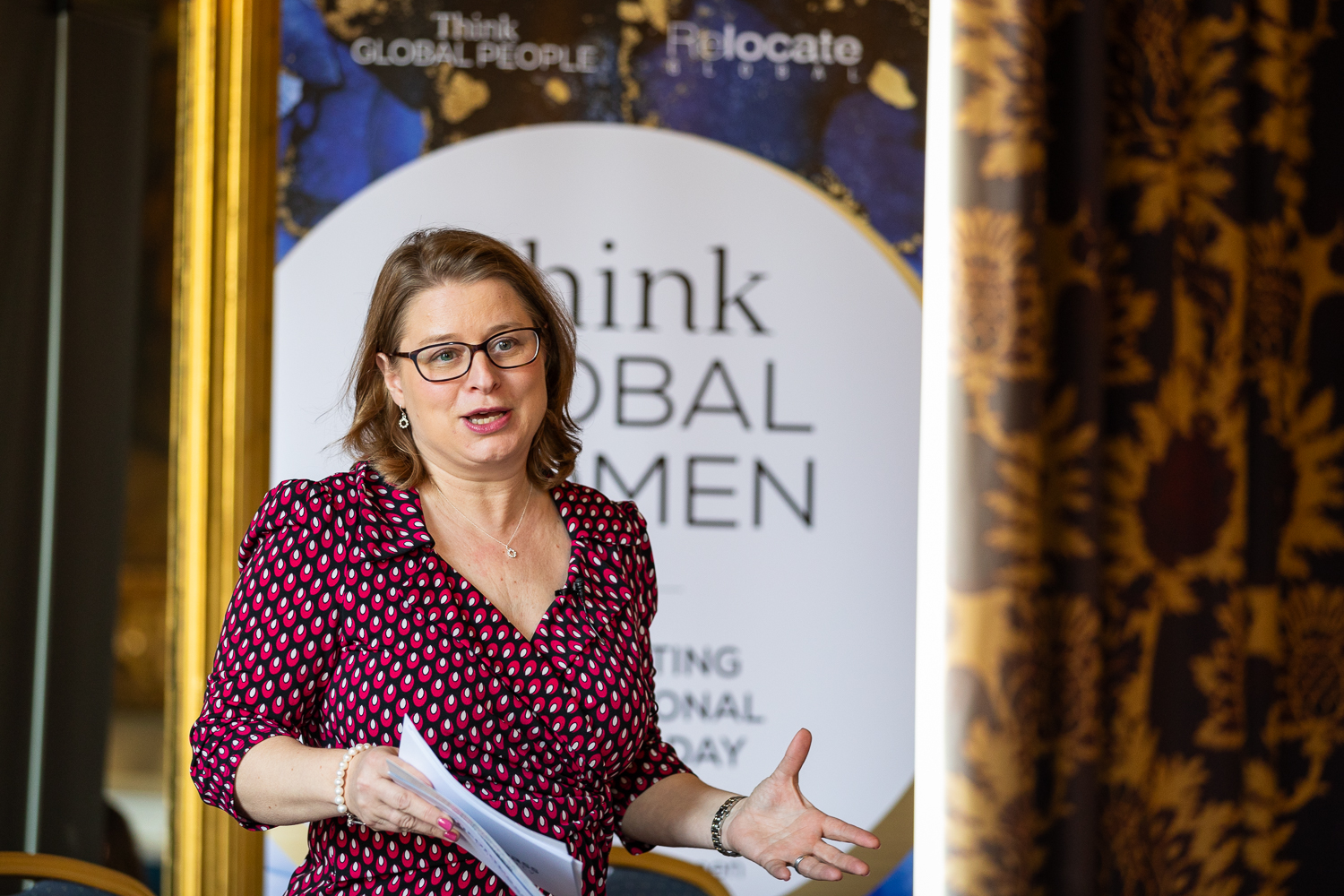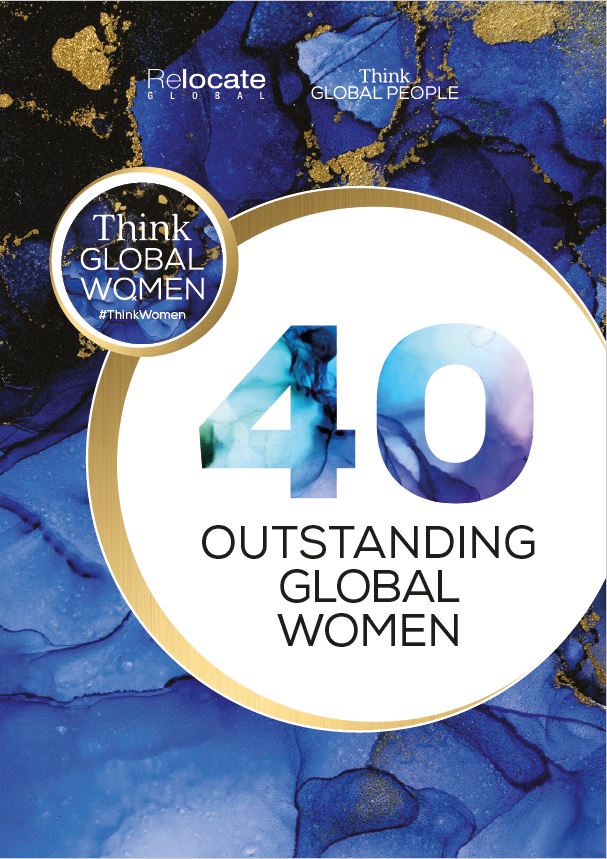Allyship and effective networking – a strategy for transforming women’s career opportunities
Marianne Curphey spoke to Joy Burnford ahead of her joining us, as the Keynote speaker for our live Think Global Women event, on 8 March 2024 in London.

Much has been done in recent years to develop women’s careers and give them training and opportunities to grow their management and leadership potential. Yet overall, many organisations still lack female representation in the boardroom and in senior management.
Consultant and equality specialist Joy Burnford is on a mission to help companies understand why their efforts to create more inclusive workspaces are faltering, and to give women and men the tools to progress their careers and reach their potential.
Her new book Don’t Fix Women: The practical path to gender equality at work, addresses the issue around why some female-led diversity initiatives are not working.
The book reveals how achieving gender balance at work isn’t about ‘fixing’ the women, it’s about changing the system. Joy argues that change is needed at organisation level to create a truly diverse, modern leadership culture, and reap the rewards that this brings for people of all genders. The book features interviews and case studies with over 100 senior business leaders and CEOs about what they are doing to accelerate progress towards gender equality. It also includes practical actions to help make change happen.

Joy and her new book “Don’t Fix Women: The practical path to gender equality at work“
What are the hallmarks of a truly inclusive workplace?
“There are three cultural frameworks that I really believe are important for organisations that want to advance gender equality,” Joy explains. “These are Allyship, Flexibility and Coaching.
“Flexibility is really important because it helps to create long term relationships of trust. When managers trust their staff, they can create a happier, more productive workplace. A lot of organisations lose female talent because women leave corporate life to set up on their own in order to find that flexibility. Coaching can help women overcome imposter syndrome and build their confidence at work.”
She argues that in order to make progress around gender equality, it is important to ensure that men in particular are engaged as allies and not alienated from the gender debate.
As the Founder and CEO of Encompass Equality (previously My Confidence Matters), she is a recognised gender equality trailblazer. With over 25 years’ experience as a business leader, non-exec director, podcast host and speaker, Joy helps organisations accelerate their journey towards sustainable gender equality by providing them with strategic advisory services, research and a range of practical solutions that create equitable places to work.
“Unless we get people who are in power to take a stand and think about what they can do to support the women within their organisations, nothing will happen,” she says. “In companies where men do play an active role in gender equality, 96% reported progress compared to 30%where they did not.”
“Men can often be passionate advocates, but sometimes they’re a bit scared about not knowing what to do and how they really make a difference,” she explains. “There is a six step process which I describe in my book which people can use. I am suggesting we put in place measures that will help everybody, not just women. I set out to write a book about how we could help women but I realised that the concepts in the book could help men too.”

Joy Burnford at our Think Women Inspire Inclusion event on 8 March 2024
Why change benefits men and women
Joy quotes feminist writer Gloria Steinem, who said that if men become allies they don’t only free others, they free themselves as well.
“In dual careers there is a balancing act between partners and that is why it is important to consider the tasks in the home if we want to support dual careers,” she says. “While allyship is important within organisations, it is also important in the home, because in order to achieve a balanced and equal playing field men need to pick up more responsibilities in the home.
“For example, networking is absolutely fundamental to career progression for everybody, but often networking events are hosted in the evenings, when it might not be very good for women who’ve got caring responsibilities to go along. When I was researching for the book, a lot of men said they were also reluctant to go to evening events too, because of their family responsibilities, so rethinking this would help everyone.”
Global opportunities for all
When thinking about opportunities for global experience, she says managers will have greater access to talent if they think more flexibly about potential candidates.
“Don’t make assumptions. It’s all about personalisation. There’s a lot of flexibility now in terms of working in a global role and not necessarily having to travel all the time. It is about removing barriers to try to level up the playing field. The same goes for intersectionality – don’t assume all women have the same issues or backgrounds. A woman from a lower socio economic background is going to have more challenges than a white middle class degree educated female. It is about how you could use being in a more privileged position to help others advance in their careers too.
“This is about enabling line managers to have better conversations with their people, because our recent research Why Women Leave has shown the role and support of line managers is really fundamental to retaining women.”
The research found that the five key issues for women within organisations were culture, line management, career progression, the day to day work itself, and the amount of work.
“If you don’t get the culture right and if you don’t have great line managers, then you could be losing your female talent,” she explains. “Line managers can unlock so much for individuals. Likewise, overwork is a big factor. Often women don’t want to say that they’re overworking or they’re struggling with too much work because they don’t want to seem under committed or unprofessional.”
Imposter syndrome and the key to unlocking confidence at work
While Joy’s early work with women was around supporting women at work and helping them overcome imposter syndrome and the fear of speaking up, it now has a greater focus on organisational change.
“Everybody I’ve ever spoken to has lacked confidence or has had impostor syndrome at some point, and it is generally when they are doing something for the first time,” she says. “The message that I always give to people is that confidence and self belief can be learned. It’s a skill that can be acquired through building up your experience and gradually acquiring the right tools.
“I could sing and act as a child, but when I joined the work place I couldn’t speak up in public. I now know that in fact you can create new connections in your brain by doing difficult tasks more and more, starting off slowly and building up your challenges.”
How managers can support women better at work
She likens a woman’s career path as climbing up a mountain with a big rucksack full of rocks, some of which are female health challenges such as menopause, menstruation, miscarriage and maternity.
“Women often have child care and elder care responsibilities, and all these things combine to slow down their career progression.
“What organisations can think about is how to take some of those rocks from the rucksack. It’s also the case that in their career women don’t necessarily want to go up, they want to go forward, they want to be inspired, they want to be challenged in their careers, they might want to go round the mountain, they might want to just take a break whilst they’re having a really, really bad time., whether that’s due to health reasons or caring responsibilities.
“Organisations can recognise that because their staff are here for the long term, they can support them and give them the opportunity to take a step back when things get hard.
“Those organisations that do this well understand that people go through different challenges and it is about being really aware of what those challenges are.”
She says that retaining female talent should be a priority for organisations and that by retaining great staff, leaders will have fewer challenges around leakage from the talent pipeline and the problems of recruiting new staff.
“When you do have more women joining, they know they are joining a place where they can thrive and have access to develop and grow into leadership roles. If you have challenges around retention and attraction then you might recruit great staff only to see them leave later on. It is worth getting that right because, as I describe in my book, every time a business replaces a salaried employee, it costs on average six to nine months salary to replace them.
“In the scenario where women are leaving your organisation it is worth investing some time to think about what you can do to keep and retain those people. That is because six to nine months’ salary is significant when you have got more senior roles.”
Another key find in the research on Why Women Leave is about embedding inclusive leadership within the organisation.
“One of the big issues that organisations need to consider is the impact of inclusive leadership and integrating a top down approach,” she explains. “It is about having leaders who think about inclusivity, gender equality and women’s careers and develop as part of their day to day role and strategy and not just something that comes up once a year. It should not be siloed into something to consider when you have gender pay gap reporting to do.”
In order to help leaders think about the way they operate, Joy has developed a framework called PACE, which is passion, accountability, curiosity and empathy.
“Those four things are really fundamental when it comes to inclusive leadership, and it should be part of the DNA of an organisation. Leaders need to be accountable, empathetic and have great curious conversations with their staff and teams.”
The business case for changing the culture to be more inclusive
Joy points to research by the polling company Gallup which found that those organisations that worked toward inclusivity and cultural change benefitted from a 33% increase in revenue. Joy believes that while programmes that support and develop women are important and worthwhile, the true benefit of supporting women’s careers can only be seen if the culture of the organisation changes too.
“We need to think about the culture of an organisation in terms of it being a bit like a goldfish bowl,” she explains. “In this goldfish bowl the women are the fish swimming around, and what often happens is that people pick up the fish, they give them some special treatment, they maybe put them on a leadership programme and spend time developing them. Then they put them back in the murky water. Without fixing the system, there is no point taking the women out and giving them the training. That is because if you put them back in the in the dirty water and they still get to swim around in that environment then they are not able to benefit from culture change. It is not about fixing the women at work – it is about changing the systems and processes that are already in place in the organisations.”
In Don’t Fix Women Joy has constructed a Gender Allies matrix which male allies can use to identify how they currently show up as an ally to women, and how to progress forward.
She has identified different types of people in companies and their attitudes to cultural change. The “ostriches” are those who are opposed to change, the “performers” are box-ticking but don’t really believe in what they are doing, and the “apprentices” want to change but are not sure how. The ideal state is having a workplace full of “champions” who are advocates for equality and inclusion.
“We work with a lot of companies who really believe in doing something positive but they are not sure what to do. We help people champion equality and bring their peers and their colleagues along with them in order to effect organisational change,” she says.
Overall, Joy’s message is very positive – companies can change for the better, men as well as women will benefit from equality, and there are clear steps you can take now to transform your workplace for everyone, regardless of race, background or gender.


We are delighted to offer all attendees a special discount on the paperback edition of Joy Burnford’s bestselling book ‘Don’t Fix Women: The practical path to gender equality at work’. This is available to purchase at a discounted rate of £10 per copy (RRP £14.99). To redeem your offer, please click on the following link and apply the coupon code RELOCATE10DFW before checkout: https://practicalinspiration.com/basket?add-to-cart=683475.
Join us on 8 March at the Institute of Directors. Book your place here.




